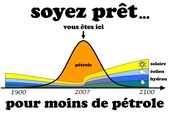The truth is that you have absolutely no idea what percentage of the product is available and has already been extracted.dirk pitt wrote:The problem is that the world oil reserves are not a tank from which we still draw the maximum flow the day before the shortage, and the next day is empty.
This is what the famous and too often used R / P ratio (reserves / current production) which gives us the theoretical number of oil years remaining makes us believe.
The truth is that when you have consumed a little more than half of the total reserve (which is the case within a few years), the flow decreases more and more.
it will therefore be necessary to do without a higher percentage of oil each year than that of the year before.
Worse: the more we try to compensate for this drop in throughput by extraction technology, the faster the drop will be. extending pleasure for a few more years will be very expensive to pay because instead of being 3 or 4% in the first years, the drop is likely to reach 10% or more when it occurs.
Everyone knows that the pond is drying up but we put more pipes to pump faster.
Again, I know it will be difficult to convince you but hey ...
First of all, you should know that we consider that a well is exhausted when we have extracted around 30% of the oil present in the reservoir. This means that in all the tanks exploited and considered exhausted, there is still (on average, of course) around 70% of crude. As drilling techniques and reservoir treatments are constantly evolving, we can legitimately think that we will come back to exploit deposits considered exhausted when the techniques have evolved (the new fields are already much more efficient than 10 years ago. ).
In addition, you should know that if today drilling is done at depths between 2000 and 5000 m, there are still many possibilities because modern drilling tools can descend to 10 meters.
Finally, be aware that there have been several major discoveries in recent years (Brazil, Kazakhstan, Angola, etc.) which point to a new stage in production capacities. As has already been said, the production capacities of oil tankers depend directly on the price of a barrel. At 150 USD, all techniques and investments can be considered. At $ 35, many of these techniques are no longer profitable. Know that gold and already a certain number of projects have been frozen while waiting for "better days" by the producers (oil companies AND the owner countries).
I totally agree with what Did67 says when he says.
On the other hand, saySuddenly, more difficult and riskier fields, the share of this expensive oil will increase in our supplies. We will be facing a sort of "geometric progression" of costs !!!
is nonsense because we hope to earn more money when we take more risks.So the costs of all this oil will go up. Company profits too, by the way
A final remark, certainly the profits of the oil companies are significant in cash and I would not go to complain but put things into perspective !!!
In recent years, roughly speaking, TOTAL has made profits of around 12 billion Euro for a turnover exceeding 120 billion Euro, ie a net margin hovering around 10%.
Ask your local craftsman how much margin he makes. Only on the resale of the material, it makes at least 30% (plus various and varied gifts at the end of the year from the suppliers).
In mass distribution, it is accepted (whatever they say) that the margins are around 50% and the risk is still limited in this part of the economy since:
- we eat every day and they know almost by the kilo ready how many doughs and flours will be sold on Monday and Friday (very limited stock);
- unsold products are taken back by the suppliers (imagine the mouth of Leclerc if you bring back ham that you ultimately did not eat);
- they have no cash problem since when we buy we pay immediately when they will only pay their suppliers in 3 months. In petroleum, several billions or even tens of billions must be invested, several years in advance before bringing out a barrel !!!
We often talk about record profits but rarely record investments which, for your information, greatly benefits French oil companies (Technip, SAIPEM, Bourbon ...).
@Christophe and Cuicui
+1 for both.







